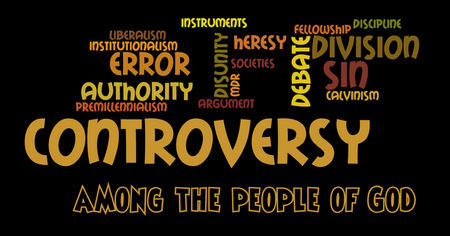Category: Truth
Subject: Truth
Contending for the Faith
The United States is among the most tolerant and permissive of societies. Yet it is a society that is extremely intolerant of a very few things. One example of intolerance is with regard to “political correctness.” There are certain attitudes and ideas, which if expressed, lead to the ruin of public reputations and careers. Often those who rush to condemn these attitudes, (what they call “hate speech”), are the same ones who clamor over the right to freedom of expression. This is incongruous, but is nevertheless a rather prominent feature of our day.
This is also true in religion. These permissive influences claim that all religions have worth and that religious criticism is a form of that “hate speech.” Pleas for toleration have led many to the irrational claim that all these terrorist attacks by Muslim fundamentalists had “nothing to do with religion.” They ignore the fact that such extremists have declared a “jihad” (holy war) against all non-muslims. Continue reading “Contending for the Faith” →
Sermon: Controversy Among the People of God

Lesson 1 of 5 in Lectureship Series.
Speaker: Stan Cox
This lesson introduces the theme, establishing the reality of controversy (as Satan does his work), and correct response of the Christian. It examines how God’s people in the first century handled the controversies that erupted.
Sermon: The Attitude of Cornelius
Sermon by Bob Ward.
An examination of Cornelius’ conversion shows a man who had an honest heart, accepting of truth, and desirous of the salvation of friends and family.
Proper Attitudes Toward Knowledge
It is right to emphasize the importance of gaining knowledge of God’s word. The Psalmist expressed the proper attitude toward seeking such knowledge when he wrote, “Blessed is the man who walks not in the counsel of the ungodly, nor stands in the path of sinners, nor sits in the seat of the scornful; but his delight is in the law of the Lord, and in His law he meditates day and night” (Psalm 1:1-2). However, it must be recognized that gaining knowledge is the means to an end in its impact on the Christian’s faith. It is not an end in itself. Our standing with God is not dependent upon of our knowledge of truth per se, but upon our acceptance of Jesus Christ as Lord.
One might object that knowledge of Christ is necessary for that acceptance, and that is entirely true. Jesus affirmed this very thing when he said to a group of Jews who expressed their faith in Him, “If you abide in My word, you are My disciples indeed. And you shall know the truth, and the truth shall make you free” (John 8:31-32). We are to be disciples of Christ. To be His disciples, we must know and adopt His teachings. However, it is important to remember that the newborn babe in Christ is as accepted of God as the most mature Christian. Immediately upon being washed in the blood of the Lamb, we receive the forgiveness of our sins, and can claim the right to an eternal inheritance. The Ethiopian Eunuch who “went on his way rejoicing” (cf. Acts 8:39) immediately following his baptism, had equal claim to the heavenly Father as the aged Paul, who had “fought the good fight” (cf. 2 Timothy 4:7) as a learned and mature apostle of the Lord. Continue reading “Proper Attitudes Toward Knowledge” →
Sermon: Our Obligations Toward Truth

Our obligations toward truth include: Procuring it, Practicing it, Proclaiming it, Protecting it, and Pleading it.
Sermon: “And if the blind lead the blind…”

Sermon by Dennis Scroggins
Truth can be understood, and must be defended, heeded, and obeyed. Too often men look to the unrighteous or ignorant for advice, rather than those who are familiar with and wise in the ways of God.
The Patternists: “Is that you, O troubler of Israel?”

1 Kings 18 records a conversation between Ahab, the evil king of Israel, and the prophet Elijah. Elijah was a thorn in Ahab’s side. Elijah told Ahab that a drought would afflict the land beacuse of his sin, and it came to pass. The drought was God’s way of chastising Ahab and the nation for their sins. But, Ahab blamed Elijah for the drought, and sought his life.
Elijah ran for his life, and evaded the king for the three years of the drought. God then instructed Elijah to go to Ahab. When they met, Ahab said, “Is that you, O troubler of Israel?” (1 Kings 18:17). Elijah’s response is instructive, “And he answered, ‘I have not troubled Israel, but you and your father’s house have, in that you have forsaken the commandments of the Lord and have followed the Baals'” (vs. 18).
Too often religious people criticize those who stand for truth as being divisive. To contend for a standard, and fidelity to God’s commands brings charges of “judging”, “intolerance” and “sectarianism.” In fact, standing with truth is not the problem. The problem is, as Elijah so eloquently said, with forsaking “the commandments of the Lord.”
Fortunately, Elijah stood tall against the king. His victory over the prophets of Baal led the people of Israel to proclaim, “The Lord, He is God” The Lord, He is God!” (vs. 39).
In the same way, we must stand for truth in the face of those who would lead God’s people astray. Hear and heed the words of Jude, “Beloved, while I was very diligent to write to you concerning our common salvation, I found it necessary to write to you exhorting you to contend earnestly for the faith which was once for all delivered to the saints” (Jude 3).
To see The Patternists Page on Facebook, click here, and Like!
Invitation: What Is Truth?
 Invitation delivered by: Bob Ward
Invitation delivered by: Bob Ward
In John 18, Pontius Pilate asked Jesus, “What is truth?” While his question may have been an expression of sarcasm or flippancy, the question itself is valid and needed.
From the Preacher’s Pen: Conformation, not Vindication
 “These were more fair- minded than those in Thessalonica, in that they received the word with all readiness, and searched the Scriptures daily to find out whether these things were so” (Acts 17:11).
“These were more fair- minded than those in Thessalonica, in that they received the word with all readiness, and searched the Scriptures daily to find out whether these things were so” (Acts 17:11).
The Bereans were fair-minded. Why? It is because they had the right attitude toward the Scriptures. For us to emulate their example, we must as well.
First, realize that the truth is the truth. That is, it is revealed, absolute and unchanging. While men’s perceptions may vacillate, the truth remains inviolate.
Our approach to truth should be a desire for conformity. We do not go to the Scriptures to rationalize and validate our settled practice or teaching. We use the Scriptures as a standard to which we compare our practice and teaching. If we find the two to be identical, we are vindicated; if we do not, we must change our practice or teaching.
We make a mistake if we go to the Scriptures with settled convictions regarding our practice or teaching. If that is so, and the two do not agree, our tendency will be to twist the Scriptures to our practice rather than to conform our practice to the Scriptures.
The question must be, what do the Scriptures teach? We then compare our own practice and teaching to the light of that divine standard, with the purpose of conforming our practice and teaching to it.
![]()
The Patternists: Contending for the Truth

Recent forays into blog and Facebook comments have again uncovered the idea that those who have the audacity to point out religious error are uncharitable, un-Christian, stubborn, and bizarre.
Some comments come from people who ridicule the concept of divine inspiration and the veracity of the Bible. Too often, however, those who show such animosity toward a defense of truth are themselves claimed followers of Christ.
To the former we confess no surprise. The idea of contending over a book which is the product of men is nonsensical, and we understand their disdain.
To the latter we defend ourselves with the following words from the pen of Jude:
“Beloved, while I was very diligent to write to you concerning our common salvation, I found it necessary to write to you exhorting you to contend earnestly for the faith which was once for all delivered to the saints” (verse 3).
To see The Patternists Page on Facebook, click here, and Like!
The Patternists: Unity VS Truth

In the introduction to Robert Shank’s book, Life in the Son, William Adams wrote:
“Some will consider that ‘unity’ is more important than truth and that, right or wrong, conformity to tradition and popular opinion is the only wise course. Men so easily become enslaved by a vested interest in the status quo, and many will refuse to venture the risk of honestly searching for truth at the possible expense of comfort.”
His words were a response to Shank’s view of the possibility of apostasy. Though he personally believed Calvin’s doctrine concerning the perseverance of the saints, he was impressed by Shank’s arguments.
He states a valid truth. Many times people believe as they do because “everyone else does,” or because “that is what we’ve always taught!” To such people, Bible teaching that contradicts their traditions is to be rejected simply because it differs from what they hold as precious.
There is no conflict between the unity called for in the Bible, and the pursuit of truth. In fact, True unity can be obtained only as we embrace the truth. Paul pleaded with the Corinthians to “all speak the same thing, and that there be no divisions among you, but that you be perfectly joined together in the same mind and in the same judgment” (1 Corinthians 1:10).
May we be fair-minded as the Bereans, who “received the word with all readiness, and searched the Scriptures daily to find out whether these things were so” (Acts 17:11).
To see The Patternists Page on Facebook, click here, and Like!
From the Preacher’s Pen: “You did not tell me the truth”

Consider the following quote from one preacher:
I would rather have thousands say to me at the judgment, “We heard you preach, and you hurt our feelings,” than have just one lost soul to say, “I heard you preach, but you did not tell me the truth.”
John T. Lewis
I understand the importance of tact in preaching the gospel of our Lord. It does no good to couch truth in terms that are unpalatable to the ears of the lost. If we can speak the truth in a way that will lead the hearer to receive it rather than reject it, we should. However, in all things, the truth must be taught!
It also is important to consider that no matter how the truth is preached, the rebellious will not accept it. When Stephen was stoned to death by an angry mob (cf. Acts 7), the fault was with the hearts of the hearers, not Stephen. For some men, no matter how careful our words, they will be offended. Jesus taught his disciples that as servants, they were not above Him as their Master. Jesus was hated, and sent to the cross. He told them when they went forth to teach His gospel “And you will be hated by all for My name’s sake. But he who endures to the end will be saved” (Matthew 10:22).
![]()
The Patternists: Bible Based Unity

The Bible reveals discord and division to be sinful. When the Corinthians showed themselves to be divided, Paul wrote, “for you are still carnal. For where there are envy, strife, and divisions among you, are you not carnal and behaving like mere men?” (1 Corinthians 3:3).
There are two ways to avoid discord. The first is commonly practiced by religious groups today. It is through compromise, setting aside doctrinal disagreements in order to get along. This is a tenet of those denominations that count themselves part of the ecumenical movement, a movement dedicated to “universal Christian unity” based on an acceptance of diverse beliefs and practices.
The second way is the Biblical philosophy of unity, based on mutual acceptance of the divine standard, the truth of God’s word. This way is identified clearly in Jesus’ prayer to God, recorded in John 17:20-21, “I do not pray for these alone, but also for those who will believe in Me through their word; that they all may be one, as You, Father, are in Me, and I in You; that they also may be one in Us, that the world may believe that You sent Me.” Our unity must mirror the unity of Jesus and His Father. Jesus stated clearly in John 5:30, “I can of Myself do nothing. As I hear, I judge; and My judgment is righteous, because I do not seek My own will but the will of the Father who sent Me.”
As Paul wrote to the Corinthians, “Now I plead with you, brethren, by the name of our Lord Jesus Christ, that you all speak the same thing, and that there be no divisions among you, but that you be perfectly joined together in the same mind and in the same judgment” (1:10). This unity in speech, thought and judgment can come only when all agree with and submit to the will of God.
To see The Patternists Page on Facebook, click here, and Like!
In the News: Is the Pope Humble?
 I am sure some who read this would object to the question. They might first object to any question of his humility as absurd. It has, after all, been his most commonly acknowledged attribute, proclaimed by the media which has covered each of his appearances in America. Others might object to the idea we might “judge” the heart of another. Who are we to deem the Pope as being anything other than what he “appears” or “claims” to be.
I am sure some who read this would object to the question. They might first object to any question of his humility as absurd. It has, after all, been his most commonly acknowledged attribute, proclaimed by the media which has covered each of his appearances in America. Others might object to the idea we might “judge” the heart of another. Who are we to deem the Pope as being anything other than what he “appears” or “claims” to be.
Of course, the judging of hearts is not appropriate. And, I freely admit that despite the adulation supplied him, his cloistered lifestyle, and his privileged existence, he continues to speak to and show compassion toward those who are poor and destitute.
Sermon: Anatomy of Institutional Apostasy
 Many denominations have departed from any semblance of Biblical faithfulness. From Heresy to Sectarianism to Denominationalism to full blown Humanism, the process of the institutional apostsy is explained.
Many denominations have departed from any semblance of Biblical faithfulness. From Heresy to Sectarianism to Denominationalism to full blown Humanism, the process of the institutional apostsy is explained.
Those who are faithful must learn from history, and heed the warnings to remain faithful to the standard, God’s word.






